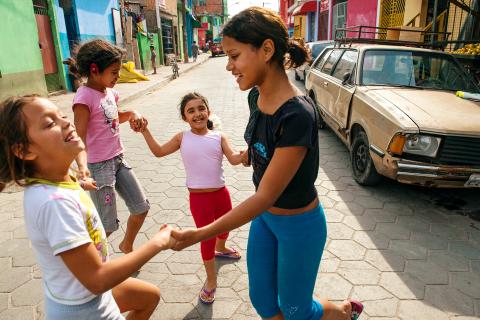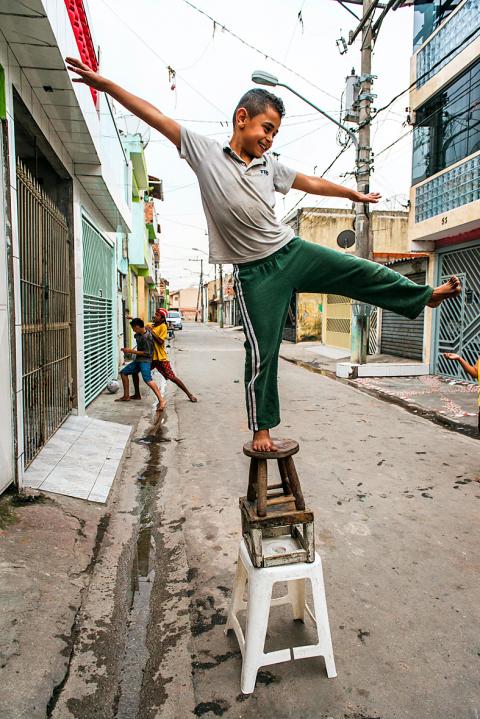New hope is sprouting near a future Brazil 2014 World Cup stadium, where a once crime-ridden shantytown has emerged as a vibrant community with skyrocketing property values.
Emerging powerhouse Brazil faces a daunting task in providing decent housing for its millions of urban poor, many of whom languish in slums, known as favelas, on the periphery of major cities.
However, in Sao Paulo, the country’s most populous and wealthiest state, increased funding and close monitoring has transformed some of these once drug-infested favelas.

Photo: AFP
A showcase of that policy is Uniao de Vila Nova, a neighborhood of 32,000 people located 25km from the Sao Paulo city center.
Like many shantytowns across Brazil, Uniao de Vila Nova was created illegally, by people who — unable to afford city rents — cobbled together squalid shacks in risky or environmentally-protected areas.
However, in place of the rickety homes — once routinely swept away by the flood waters of the nearby Tiete Tiver during the rainy season — the 1 million square meter area has morphed into a clean, safe and proud community.

Photo: AFP
The changes began a decade ago, when authorities launched a program to “urbanize” the favelas. They helped residents upgrade their homes and brought in basic services such as running water, paved roads, electricity and public transport.
The results have been striking.
“We have not had any murders in six years, while we used to have four a day in the 1990s,” community leader Geraldo de Pindola Melo said.
Melo migrated in 1984 from the northeastern state of Pernambuco, joining the 6 percent of Sao Paulo’s 42 million people who live in shantytowns.
The 42-year-old now lives with his wife and four children in a small, brightly colored house that he built and upgraded over the years, with help from the Sao Paulo state housing agency CDHU.
“This is a very cohesive, stable community,” he said.
Today, the neighborhood has seven schools, three daycare centers, a local soccer league with 28 teams and a recycling cooperative employing 36 trash pickers, most of them women.
Residents also have a handicraft workshop, a gardening school equipped with a greenhouse and a factory where rehabilitated drug addicts come to make vuvuzelas, the noise-making trumpets popularized by South African football fans during the last World Cup.
A new train station is set to open early next year, while a technical college is to be built and residents hope to get a new mini-hospital soon.
Throughout the neighborhood, residents showed off new, well-equipped apartments, built with CDHU funding and rented for 15 percent of their income.
“We have 3,010 families living in new vertical apartment blocks funded by CDHU, while 5,300 families live in their own urbanized homes,” said Valkaria Marques de Paula, a CDHU official.
Valeria Araujo da Silva, the local urbanization secretary, has seen the transformation of her neighborhood since she moved to Uniao de Vila Nova 16 years ago.
She and her husband built their own house, and thanks to the property boom in Sao Paulo’s eastern district — where construction is underway on the stadium that will host the opening game of the 2014 World Cup — da Silva says her home is now valued at US$65,000.
The prices of many homes in the neighborhood have jumped as World Cup fever grows and word spreads about the emerging community in Uniao de Vila Nova.
“In 2000, you could buy a 25m2 apartment for US$1,000 here; now it is worth US$25,000,” said Ailton Severino Dias, better known as Pe de Frango, who arrived here 20 years ago and also built his own home.
Authorities are in the process of carrying out land registration in urbanized favelas and homeowners are to begin receiving ownership titles in the next few months. In exchange, said de Paula, they will have to pay property taxes.
De Paula said the urbanization policy works if “you empower the residents.”
“We have been training community leaders that then teach responsible citizenship. We have launched health and sanitation awareness campaigns and residents have responded,” she added.
CDHU president Antonio Carlos do Amaral said: “our job is to reintegrate marginalized people into society as productive citizens. Housing is only one phase of that process.”
He called for expanding the projects, which would require the city, the federal government and the private sector to get involved.
Sao Paulo state has an annual housing budget of US$1.1 billion, 43 percent of which is spent on building new homes or upgrading existing ones for favela residents, according to Eduardo Trani of CDHU.
Over the past 20 years, some 500,000 homes have been built for an estimated 2 million low-income people across the state.
However, state officials say there is a still a deficit of half a million dwellings for the poor and another 2 million homes deemed sub-standard.
The Sao Paulo metropolitan area alone is home to 20 million people, roughly 10 percent of whom live in favelas and illegal settlements.

‘EYE FOR AN EYE’: Two of the men were shot by a male relative of the victims, whose families turned down the opportunity to offer them amnesty, the Supreme Court said Four men were yesterday publicly executed in Afghanistan, the Supreme Court said, the highest number of executions to be carried out in one day since the Taliban’s return to power. The executions in three separate provinces brought to 10 the number of men publicly put to death since 2021, according to an Agence France-Presse tally. Public executions were common during the Taliban’s first rule from 1996 to 2001, with most of them carried out publicly in sports stadiums. Two men were shot around six or seven times by a male relative of the victims in front of spectators in Qala-i-Naw, the center

Canadian Prime Minister Mark Carney is leaning into his banking background as his country fights a trade war with the US, but his financial ties have also made him a target for conspiracy theories. Incorporating tropes familiar to followers of the far-right QAnon movement, conspiratorial social media posts about the Liberal leader have surged ahead of the country’s April 28 election. Posts range from false claims he recited a “satanic chant” at a campaign event to artificial intelligence (AI)-generated images of him in a pool with convicted sex offender Jeffrey Epstein. “He’s the ideal person to be targeted here, for sure, due to

DISPUTE: Beijing seeks global support against Trump’s tariffs, but many governments remain hesitant to align, including India, ASEAN countries and Australia China is reaching out to other nations as the US layers on more tariffs, in what appears to be an attempt by Beijing to form a united front to compel Washington to retreat. Days into the effort, it is meeting only partial success from countries unwilling to ally with the main target of US President Donald Trump’s trade war. Facing the cratering of global markets, Trump on Wednesday backed off his tariffs on most nations for 90 days, saying countries were lining up to negotiate more favorable conditions. China has refused to seek talks, saying the US was insincere and that it

As Elon Musk called one of US President Donald Trump’s top economic aides a “moron,” the White House on Tuesday declared that “boys will be boys.” Musk and long-time Trump trade adviser Peter Navarro have been squabbling publicly over Trump’s decision to impose sweeping tariffs on most of its trading partners. The move has triggered a market sell-off and prompted analysts to wonder if the US is headed into a recession. “Look, these are obviously two individuals who have very different views on trade and on tariffs,” White House press secretary Karoline Leavitt said. “Boys will be boys, and we